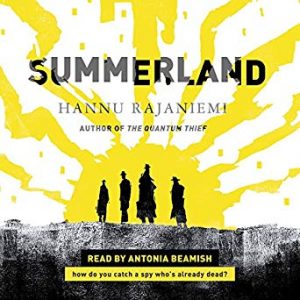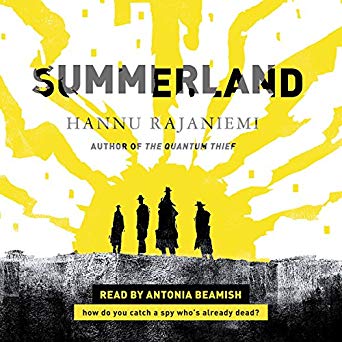Amy Goldschlager Reviews Summerland Audiobook by Hannu Rajaniemi
 Summerland, Hannu Rajaniemi; Antonia Beamish, narrator (Macmillan Audio, $23.95, digital download, 10 hr., unabridged) June 2018.
Summerland, Hannu Rajaniemi; Antonia Beamish, narrator (Macmillan Audio, $23.95, digital download, 10 hr., unabridged) June 2018.
Rajaniemi’s standalone supernatural spy thriller is set in an alternate Cold War during the 1930s. The British have successfully colonized a piece of the afterlife, which they call Summerland, and the Soviets have built a supercomputer based on a hive mind of the deceased, controlled by the spirit of Lenin. The two sides conduct spycraft with agents from the living and the dead (who can communicate with the living world on special phones or travel there by possessing a willing medium). Rachel White, an analyst with the Winter Court, the corporeal agency in British Intelligence, witnesses the suicide of a defecting Soviet agent, who with his dying breath identifies a mole in the Summer Court, the dead contingent of British Intelligence. Unfortunately, the ghostly mole in question, Peter Blum, is practically untouchable, because he is the illegitimate son of the Prime Minister. But Rachel refuses to be dissuaded and initiates her own rogue investigation, relentlessly searching for evidence of Peter’s treachery that her superiors will not be able to ignore; in the process, she uncovers a conspiracy that will expose the darkest truths about the Summerland.
Narrator Antonia Beamish does a commendable job in acting out the text, which calls upon her both to do a “drunken voice” and the strained voice of someone recovering from an attempted strangulation. She also has to manage Russian and Dutch accents in addition to upper-crust English, and all seem plausible.
I remember reviewing the audiobook of Rajaniemi’s first novel, The Quantum Thief, for my first column in this magazine. It was a fairly overwhelming production to cover, because it involved high-level physics, incredibly complex world-building, and a glossary’s worth of new vocab. When you can’t skim or go back easily to an earlier point in the story, it can be tough to get a handle on something so high concept. I was also overcome by the beauty and complexity of it; I relished the challenge of parsing the prose, and I loved that the audio version kept my eyes free to imagine visions of that different, often beautiful, universe. In contrast, Summerland is fairly easy to grasp: It’s John Le Carré with dead people. Perhaps this is a minority viewpoint, but I don’t much care for the grim, paper-pushing spycraft of Le Carré, even if it is a more realistic take on how spying works than say, Ian Fleming’s fiction. Charles Stross also takes on Le Carré, (in conjunction with Lovecraft, no less), but he has such a charming sense of the absurd that he makes that milieu fun. This book has an intriguing premise, but it was ultimately a slog, because it was difficult for me to understand why people would even want to go to the Summerland. This afterlife involves commuting, more paperwork, and a continual, desperate effort to earn the substance (“vim”) to maintain one’s coherence. Oblivion, and even a possible try at some different kind of afterlife (vaguely hinted at toward the end) seems preferable.
I admire the dedication toward building the premise, even if I didn’t quite enjoy the result.
This review and more like it in the January 2019 issue of Locus.
 While you are here, please take a moment to support Locus with a one-time or recurring donation. We rely on reader donations to keep the magazine and site going, and would like to keep the site paywall free, but WE NEED YOUR FINANCIAL SUPPORT to continue quality coverage of the science fiction and fantasy field.
While you are here, please take a moment to support Locus with a one-time or recurring donation. We rely on reader donations to keep the magazine and site going, and would like to keep the site paywall free, but WE NEED YOUR FINANCIAL SUPPORT to continue quality coverage of the science fiction and fantasy field.








